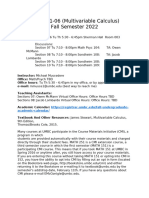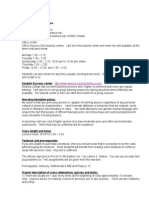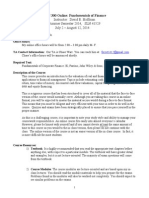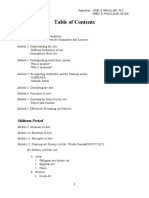0 ratings0% found this document useful (0 votes)
80 viewsMAT260 Syllabus
This document outlines the course details for Math 260 Discrete Mathematics taught in the fall of 2014. The instructor is Heather Jordon and the course will cover topics in discrete mathematics as outlined in the textbook. Students will complete daily homework assignments, reading assignments, three exams, and a final exam. Grades will be determined based on points earned on homework, reading assignments, exams, and the final exam. The course meets requirements and students should ensure they have the necessary prerequisites to be successful.
Uploaded by
skiloh1Copyright
© © All Rights Reserved
Available Formats
Download as PDF, TXT or read online on Scribd
0 ratings0% found this document useful (0 votes)
80 viewsMAT260 Syllabus
This document outlines the course details for Math 260 Discrete Mathematics taught in the fall of 2014. The instructor is Heather Jordon and the course will cover topics in discrete mathematics as outlined in the textbook. Students will complete daily homework assignments, reading assignments, three exams, and a final exam. Grades will be determined based on points earned on homework, reading assignments, exams, and the final exam. The course meets requirements and students should ensure they have the necessary prerequisites to be successful.
Uploaded by
skiloh1Copyright
© © All Rights Reserved
Available Formats
Download as PDF, TXT or read online on Scribd
You are on page 1/ 4
Fall 2014
Math 260 Discrete Mathematics
Instructor: Heather Jordon
Office: Stevenson 312H
Phone: 4387838
Email: hjordon@ilstu.edu (great way to ask me a question if you cannot
come to oce hours)
Office Hours: 2:304:00 MW, and by appointment.
Course Home Page: http://math.illinoisstate.edu/hjordon/Math260/
Text: Discrete Mathematics with Graph Theory, Third Edition, by Goodaire and Parmenter,
Prentice Hall, 2006. We will cover most of Chapters 17, 912 as well as additional topics
pertaining to topics discussed in class.
Prerequisites: C or better in MAT 146. If you do not satisfy this prerequisite, please talk
to your advisor or me. Your success in this course depends on having the necessary
prerequisites. This class will involve writing proofs; therefore you will learn some of the
proof techniques needed in subsequent courses.
Homework: Daily homework assignments from the text will be made. Although these home-
work assignments will not be collected, you are expected to do all homework problems
assigned. Homework quizzes will be given (see below) over the problems assigned. You
will be given an opportunity at the beginning of each class period to ask questions over
the previous class periods homework assignment. Therefore, it is imperative that you
attempt all homework problems assigned before they are discussed in class, even though
not all problems will be collected and graded. Problems similar to the those assigned
(although not necessary graded) could appear on exams. Therefore, you should make
every attempt to complete all problems assigned, regardless of whether or not
they are collected and graded. Daily homework assignments will be posted on the
course web site.
In addition to the daily homework assignments from the text, there will be ten problem
sets collected throughout the semester. These problem sets will be worth 20 points each,
giving 150 points towards your nal grade. When a problem set has been selected,
you are not to discuss those problems with anyone but me. Late homework will
be accepted one class period after it is due at a 50% discount.
A word about collected problem sets . . . Staple your assignment if it is more than
one page. You want to show me your best work on the collected problem sets. Therefore,
make it neat and readable. Homework that does not follow the above guidelines
will be returned without credit.
1
Reading Assignments: A major portion of this course will involve reading your textbook.
For almost every meeting we have, you will be given a reading assignment, together with
a few short questions, to respond to prior to class. Your responses will be sent via email
and the details of this process are given in the handout Reading Assignment Guidelines.
For each submission, you will receive a grade of 0 or 1 depending on whether the questions
were answered completely and submitted on time. The total of these scores will count
75 points towards your nal grade. Daily reading assignments will also be posted on the
course web site.
Exams: There will be three exams, each worth 125 points. Exams will be given from 6:008:00
P.M. on the following dates:
17 September, 22 October, 19 November
You are expected to take all exams. Generally, there are no make-up exams. In the event
of an emergency and with prior notication, alternatives can be discussed.
Final Exam: The nal exam will be comprehensive and will be worth 150 points. There are
no make-ups on the nal exam, unless there is an emergency. The nal exam is scheduled
for XXX December from XXXX.
Withdrawal: The last day to withdraw and receive a grade of WX is Friday, 10 October 2014.
Course Description: We will study logic, sets, relations, equivalence relations, functions,
counting techniques including permutations, combinations, the pigeon hole principle and
inclusion-exclusion, graphs including digraphs, trees, and applications.
Here are some situations commonly explored using discrete mathematics:
What is the shortest route from Miami to Seattle?
What is the best way to assign pilots to ights, honoring the pilots destination
requests?
What is the smallest number of meeting times for the standing committees of the
State Senate if every senator is on one or more of these committees and no two
committees can meet at the same time if they have a senator in common?
Special Needs: If you need an accommodation for which you are eligible, please inform me
at the beginning of the semester (during the rst two weeks of class) so that this can be
implemented.
2
Grades: A breakdown of the points is as follows:
Homework Assignments 200
Reading Assignments 75
Exams 375
Final 150
Total 800
Grading Scale: Grades for the course are based on the following percentages:
A [90, 100] B [80, 90) C [70, 80) D [60, 70) F [0, 59)
Course Website: The course website for this class is a valuable resource where you will nd
helpful information including daily homework and reading assignments, almost all of the
course handouts including sample exams, and important deadlines for exams, papers, etc.
The website can be found at http://math.illinoisstate.edu/hjordon/Math260/. I
encourage you to bookmark this page with your web browser so that you may access it
easily.
Class Etiquette: Please be on time to class. It is disrupting to the ow of class when students
arrive late. Please do not get up and leave during class time. Please turn o your cell
phone. Please do not eat in class. Please do not start packing up your things before class
is over. Our class meets for 70 minutes, and I will use each and every one of them.
Email Etiquette: During the semester it is likely that you will contact me by email with a
question about something from class. Please address your email with Dr. Jordon. Also,
you must sign your email, i.e., John Smith, so that I know who the email is from.
The exceptions to this are your email responses to the daily reading assignments. These
responses do not need to be addressed nor signed. Please do not ask questions whose
answers can be found on the course handouts or website.
General Advice: Attend every class period! Attendance and active participation in this
course are expected and encouraged. You are responsible for all material presented and
all announcements made on the days you are absent. (The course web site is an excellent
source of information if you must miss a class.) Attending class and participating in class
discussions will be very helpful in preparing for exams and in doing the homework. MATH
IS NOT A SPECTATOR SPORT. To succeed in this course, you will most likely require
twelve or more hours per week in class attendance, daily study, and homework. If you
nd that you are having trouble with a particular section or topic, act quickly to catch
up. If you have any problems or questions, please seek extra help from me. Make use of
my oce hours, or if that is not possible for some reason, make arrangements to see me
at another time. It is also very helpful to have a study buddy. Get to know someone in
3
class and arrange to study/do homework together. Often times we really learn something
when we explain it to others.
This is a course in discrete mathematics, but it is also a course that emphasizes careful
expression of logical arguments. Homework problems and test questions require clear and
concise explanations of why something is true. Words like construct, show, obtain,
determine, etc., explicitly state that a proof is required. Use complete sentences that
accurately state your ideas. Results covered in class can be used without proof if you state
them correctly. Mean what you say. Be honest with yourself. If you havent completed
a proof or dont understand how the conclusion follows, then dont claim the conclusion.
Examples given where the conclusion holds usually do not constitute a proof. Statements
with a number as the parameter must be proved for all possible instances. Say what
you mean. State your ideas accurately. Omitting words can lead to sentences that mean
something other than you intended. Dene any terminology you introduce. Be careful not
to use the same notation or terminology for more than one mathematical object.
Start the homework early. If the statement of an exercise, or what needs to be done to
complete it, is unclear, thinking about it early allows time to ask for clarication, by email
or in person. If you are having trouble understanding or proving something, please come
say here is what I was trying, but it doesnt seem to work; what am I doing wrong?
Also, trying to explain a proof orally to another person is a valuable way to nd a better
proof or expose gaps in an incorrect proof.
4
You might also like
- New York City SHSAT Prep 2022 & 2023: 3 Practice Tests + Proven Strategies + ReviewFrom EverandNew York City SHSAT Prep 2022 & 2023: 3 Practice Tests + Proven Strategies + ReviewNo ratings yet
- AM/ECON 11B, Fall 2019. MWF 2:40 - 3:45 PM, Earth&Marine B206 CanvasNo ratings yetAM/ECON 11B, Fall 2019. MWF 2:40 - 3:45 PM, Earth&Marine B206 Canvas6 pages
- Lmitterm@capital - Edu: Intermediate Accounting INo ratings yetLmitterm@capital - Edu: Intermediate Accounting I11 pages
- Pre-Calculus Course Syllabus: Algebraic, Eighth EditionNo ratings yetPre-Calculus Course Syllabus: Algebraic, Eighth Edition4 pages
- Accounting 401 Advanced Financial Accounting Professor Tom King Summer Term, 2000No ratings yetAccounting 401 Advanced Financial Accounting Professor Tom King Summer Term, 20008 pages
- Recitation Sessions: Recitation Sessions Are An Opportunity For You To DeepenNo ratings yetRecitation Sessions: Recitation Sessions Are An Opportunity For You To Deepen11 pages
- Hall E-Mail: After Hours: MTW,.and: Office Right) PHONE: Office Ext.4283 WhichNo ratings yetHall E-Mail: After Hours: MTW,.and: Office Right) PHONE: Office Ext.4283 Which7 pages
- psychology+140+fall+2014+section+1+CORRECTED+FOR+VETERAN S+DAY+HOLIDAYNo ratings yetpsychology+140+fall+2014+section+1+CORRECTED+FOR+VETERAN S+DAY+HOLIDAY4 pages
- Econ 332 Economic Analysis of Labor Markets: Case Western Reserve UniversityNo ratings yetEcon 332 Economic Analysis of Labor Markets: Case Western Reserve University3 pages
- 11th Grade English: British Literature: Class Policies & Expectations 2011-2012 Mrs. KwiatkowskiNo ratings yet11th Grade English: British Literature: Class Policies & Expectations 2011-2012 Mrs. Kwiatkowski2 pages
- ENG 102 - College Composition II: Course InformationNo ratings yetENG 102 - College Composition II: Course Information8 pages
- Phys 171 Physical Science: About This CourseNo ratings yetPhys 171 Physical Science: About This Course3 pages
- PHYS-1100 Physics I Fall 2007: Course Coordinator: Prof. Christian WetzelNo ratings yetPHYS-1100 Physics I Fall 2007: Course Coordinator: Prof. Christian Wetzel15 pages
- OM 335 (04180) Operations Management Spring 2013: MW 8:00 AM - 9:30 AM in GSB 5.142ANo ratings yetOM 335 (04180) Operations Management Spring 2013: MW 8:00 AM - 9:30 AM in GSB 5.142A6 pages
- Boot Camp for Your Brain: A No-Nonsense Guide to the SatFrom EverandBoot Camp for Your Brain: A No-Nonsense Guide to the SatNo ratings yet
- Boot Camp for Your Brain: A No-Nonsense Guide to the Sat Fifth EditionFrom EverandBoot Camp for Your Brain: A No-Nonsense Guide to the Sat Fifth EditionNo ratings yet
- Numbers Pattern Matching: Sentences Are Actually Expressions and NotNo ratings yetNumbers Pattern Matching: Sentences Are Actually Expressions and Not1 page
- IT225: Computer Organizations: August 25, 2014 (Monday)No ratings yetIT225: Computer Organizations: August 25, 2014 (Monday)12 pages
- Preface: Gal3434x - FM - I-Xvi - Indd Xi Gal3434x - FM - I-Xvi - Indd Xi 03/01/12 5:43 PM 03/01/12 5:43 PMNo ratings yetPreface: Gal3434x - FM - I-Xvi - Indd Xi Gal3434x - FM - I-Xvi - Indd Xi 03/01/12 5:43 PM 03/01/12 5:43 PM5 pages
- Determination of Precision and Bias Data For Use in Test Methods For Petroleum Products and LubricantsNo ratings yetDetermination of Precision and Bias Data For Use in Test Methods For Petroleum Products and Lubricants34 pages
- Module in Art Appreciationdocx PDF Free PDF100% (1)Module in Art Appreciationdocx PDF Free PDF54 pages
- Kamal Drives Expensive Cars. He Lives Happily in A Fancy HouseNo ratings yetKamal Drives Expensive Cars. He Lives Happily in A Fancy House1 page
- Advanced Management Science: Quantitative Approaches To Decision MakingNo ratings yetAdvanced Management Science: Quantitative Approaches To Decision Making69 pages
- Cbse Psychology Class Xi Practical 2020-21 Viva Questions100% (5)Cbse Psychology Class Xi Practical 2020-21 Viva Questions5 pages
- Download Laura Ingalls Wilder 1st Edition Amy Sickels ebook All Chapters PDF100% (3)Download Laura Ingalls Wilder 1st Edition Amy Sickels ebook All Chapters PDF81 pages
- Developing Teamwork and Communication Skills in A MultidisciplinNo ratings yetDeveloping Teamwork and Communication Skills in A Multidisciplin4 pages
- Writing The Discussion Chapter - Chapter 5100% (8)Writing The Discussion Chapter - Chapter 511 pages
- New York City SHSAT Prep 2022 & 2023: 3 Practice Tests + Proven Strategies + ReviewFrom EverandNew York City SHSAT Prep 2022 & 2023: 3 Practice Tests + Proven Strategies + Review
- AM/ECON 11B, Fall 2019. MWF 2:40 - 3:45 PM, Earth&Marine B206 CanvasAM/ECON 11B, Fall 2019. MWF 2:40 - 3:45 PM, Earth&Marine B206 Canvas
- Pre-Calculus Course Syllabus: Algebraic, Eighth EditionPre-Calculus Course Syllabus: Algebraic, Eighth Edition
- Accounting 401 Advanced Financial Accounting Professor Tom King Summer Term, 2000Accounting 401 Advanced Financial Accounting Professor Tom King Summer Term, 2000
- Recitation Sessions: Recitation Sessions Are An Opportunity For You To DeepenRecitation Sessions: Recitation Sessions Are An Opportunity For You To Deepen
- Hall E-Mail: After Hours: MTW,.and: Office Right) PHONE: Office Ext.4283 WhichHall E-Mail: After Hours: MTW,.and: Office Right) PHONE: Office Ext.4283 Which
- psychology+140+fall+2014+section+1+CORRECTED+FOR+VETERAN S+DAY+HOLIDAYpsychology+140+fall+2014+section+1+CORRECTED+FOR+VETERAN S+DAY+HOLIDAY
- Econ 332 Economic Analysis of Labor Markets: Case Western Reserve UniversityEcon 332 Economic Analysis of Labor Markets: Case Western Reserve University
- 11th Grade English: British Literature: Class Policies & Expectations 2011-2012 Mrs. Kwiatkowski11th Grade English: British Literature: Class Policies & Expectations 2011-2012 Mrs. Kwiatkowski
- ENG 102 - College Composition II: Course InformationENG 102 - College Composition II: Course Information
- PHYS-1100 Physics I Fall 2007: Course Coordinator: Prof. Christian WetzelPHYS-1100 Physics I Fall 2007: Course Coordinator: Prof. Christian Wetzel
- OM 335 (04180) Operations Management Spring 2013: MW 8:00 AM - 9:30 AM in GSB 5.142AOM 335 (04180) Operations Management Spring 2013: MW 8:00 AM - 9:30 AM in GSB 5.142A
- Boot Camp for Your Brain: A No-Nonsense Guide to the SatFrom EverandBoot Camp for Your Brain: A No-Nonsense Guide to the Sat
- Math Study Strategies: 40 Strategies You Can Use Today!From EverandMath Study Strategies: 40 Strategies You Can Use Today!
- Boot Camp for Your Brain: A No-Nonsense Guide to the Sat Fifth EditionFrom EverandBoot Camp for Your Brain: A No-Nonsense Guide to the Sat Fifth Edition
- Numbers Pattern Matching: Sentences Are Actually Expressions and NotNumbers Pattern Matching: Sentences Are Actually Expressions and Not
- IT225: Computer Organizations: August 25, 2014 (Monday)IT225: Computer Organizations: August 25, 2014 (Monday)
- Preface: Gal3434x - FM - I-Xvi - Indd Xi Gal3434x - FM - I-Xvi - Indd Xi 03/01/12 5:43 PM 03/01/12 5:43 PMPreface: Gal3434x - FM - I-Xvi - Indd Xi Gal3434x - FM - I-Xvi - Indd Xi 03/01/12 5:43 PM 03/01/12 5:43 PM
- Determination of Precision and Bias Data For Use in Test Methods For Petroleum Products and LubricantsDetermination of Precision and Bias Data For Use in Test Methods For Petroleum Products and Lubricants
- Kamal Drives Expensive Cars. He Lives Happily in A Fancy HouseKamal Drives Expensive Cars. He Lives Happily in A Fancy House
- Advanced Management Science: Quantitative Approaches To Decision MakingAdvanced Management Science: Quantitative Approaches To Decision Making
- Cbse Psychology Class Xi Practical 2020-21 Viva QuestionsCbse Psychology Class Xi Practical 2020-21 Viva Questions
- Download Laura Ingalls Wilder 1st Edition Amy Sickels ebook All Chapters PDFDownload Laura Ingalls Wilder 1st Edition Amy Sickels ebook All Chapters PDF
- Developing Teamwork and Communication Skills in A MultidisciplinDeveloping Teamwork and Communication Skills in A Multidisciplin




























































































